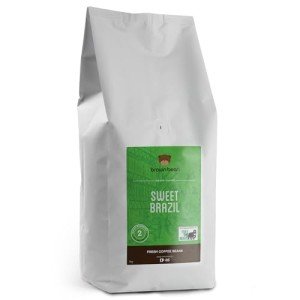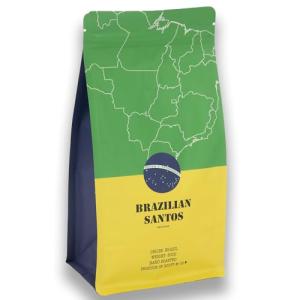Caffè Nero, renowned for its high-quality coffee offerings, has long been a staple for coffee lovers around the globe. Among its array of products, the Brazil Whole Roasted Coffee Beans stands out as a beloved choice, appealing to both casual drinkers and connoisseurs alike. This guide delves into the unique characteristics, origins, brewing tips, and societal impact of Brazil whole roasted coffee beans from Caffè Nero.
A Glimpse into Brazil’s Coffee Industry
Brazil is the largest coffee producer in the world, accounting for around one-third of global coffee production. The country’s sprawling coffee plantations thrive under its favorable climate, characterized by warm temperatures, rich soil, and adequate rainfall. Brazilian coffee beans are diverse, ranging from mild and nutty flavors to fruity and acidic profiles. This wide variety makes Brazil a significant contributor to the international coffee market and a favorite for roasters seeking quality beans.
Key Coffee-Growing Regions in Brazil:
- Minas Gerais: Renowned for its mountainous terrain, it produces beans with a balanced profile, often featuring chocolate and caramel flavors.
- Sao Paulo: Known for its medium-bodied coffees that carry a fruity and nutty richness.
- Espírito Santo: This region is famous for producing high-quality arabica beans that are often less acidic but still flavorful.
The Journey from Bean to Brew: How Caffè Nero Sources Its Coffee
Caffè Nero prides itself on sourcing its coffee beans from respected growers, ensuring sustainability and quality. The process generally includes:
- Sourcing: Direct relationships with Brazilian farmers allow Caffè Nero to select the finest beans.
- Harvesting: Coffee cherries are handpicked at the peak of ripeness, ensuring the best flavor profile.
- Processing: Beans undergo a meticulous process, often involving washed or natural methods that impact flavor extraction.
- Roasting: Caffè Nero employs skilled roasters who craft the beans to ensure they reach their fullest potential, highlighting the unique notes of the Brazilian coffee.
- Distribution: The carefully roasted beans are packaged and shipped, maintaining their freshness until they reach the consumer.
Flavor Profile of Brazil Whole Roasted Coffee Beans
The Brazil Whole Roasted Coffee Beans from Caffè Nero are celebrated for their:
- Nutty Finish: A hallmark of Brazilian coffee, lending a comforting and familiar taste.
- Mild Acidity: Compared to other coffee varieties, Brazilian beans tend to be less acidic, making them an excellent choice for those sensitive to acidity.
- Chocolate Undertones: Rich, sweet notes that are reminiscent of dark chocolate, providing depth to each cup.
- Smooth Texture: Enjoyable mouthfeel, enabling a consistent brew that caters to various preferences.
Whether brewed as espresso, drip coffee, or in a French press, these beans promise a rich cup that can awaken the senses and offer a delightful coffee experience.
Brewing Methods for Optimal Enjoyment
To fully appreciate the nuances of Brazilian coffee, it is essential to employ proper brewing techniques. Here are some popular methods for brewing:
-
French Press:
- Coarsely grind the beans.
- Use a coffee-to-water ratio of 1:15.
- Steep for about four minutes before pressing the plunger.
-
Pour Over:
- Use a medium grind for even extraction.
- Slowly pour hot water over the grounds in a circular motion.
- Maintain a coffee-to-water ratio of 1:17 for balance.
-
Espresso:
- Finely grind the beans.
- Use 18-20 grams of coffee for a double shot.
- Aim for a brew time of 25-30 seconds for optimal flavor extraction.
-
Cold Brew:
- Coarsely grind the beans.
- Steep in cold water for 12-24 hours.
- Strain and enjoy over ice for a smooth, refreshing cup.
The Societal Impact of Coffee
Coffee is more than just a beverage; it holds significance at social, cultural, and economic levels. In Brazil, coffee is an integral part of the national identity. It serves as a source of income for millions of farmers and workers in the supply chain. Ethical and sustainable practices initiated by companies such as Caffè Nero are crucial in advocating for fair trade and supporting farming communities.
Benefits of Supporting Sustainable Coffee
- Economic Empowerment: Fair trade practices allow farmers to earn a stable income.
- Environmental Benefits: Sustainable farming protects land and biodiversity.
- Quality Control: Sustainable practices often yield higher quality beans due to better farming methods.
FAQs About Brazil Whole Roasted Coffee Beans by Caffè Nero
Q1: Where can I buy Caffè Nero’s Brazil whole roasted coffee beans?
A1: Caffè Nero’s Brazil whole roasted coffee beans are available at Caffè Nero locations, their online shop, and select retailers.
Q2: What is the best way to store whole roasted coffee beans?
A2: Store coffee beans in an airtight container, away from light, heat, and moisture to maintain freshness.
Q3: How long do whole roasted coffee beans last?
A3: When stored properly, whole roasted coffee beans can last 2-4 weeks for optimal flavor, though they may remain potable for several months.
Q4: Can I use Brazil coffee beans for espresso?
A4: Yes! Brazil whole roasted coffee beans can be an excellent choice for espresso, providing a creamy and rich profile.
Caffè Nero’s Brazil Whole Roasted Coffee Beans encapsulate the rich heritage of Brazilian coffee while offering a delightful experience for those seeking quality brews. By understanding the journey of these beans from farm to cup, coffee enthusiasts can appreciate not only the taste but also the cultural and social significance tied to each brew. Whether enjoyed on its own or as part of a social gathering, Caffè Nero's Brazilian offering is sure to enhance those moments with warmth and flavor.






